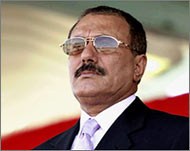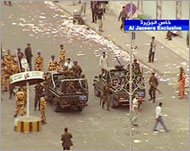Yemenis killed in riots over fuel prices
At least eight people have been killed in Yemen in clashes with police as demonstrators threw stones at government buildings to protest against subsidy cuts raising petrol prices.

Riot police on Wednesday fired live ammunition to disperse protests, and several demonstrators were either wounded or killed, reported Aljazeera’s correspondent Ahmad al-Shalafi. Protesters blocked roads, broke windows of shops, banks and government buildings and torched vehicles, al-Shalafi said.
Police confirmed that eight people, including a security guard, were killed in the capital, Sanaa, and the southwestern provinces of Dhamar and Ad Dali, 155km and 200km south of Yemen, respectively, The Associated Press reported.
Residents of a commercial street in Sanaa said two people were killed, including a 12-year-old, in an exchange of fire with security forces.
 |
|
Yemeni soldiers deploy in |
Protesters shouted slogans against Prime Minister Abdul-Qadir Bagammal and the ruling party of President Ali Abdullah Saleh.
The military reinforced police presence across Sanaa to control protesters and in one neighbourhood tried to prevent protesters from charging towards the ruling party’s headquarters.
The government said the decision to cut fuel subsidies – which it had postponed announcing at least thrice to avoid sparking protests – would help alleviate the budget deficit.
Critics said curbing public expenditure, including military spending, would have been more effective.
The cut in subsidies meant fuel costs rose between 90% and 300%, al-Shalafi said.
Low-income areas
 |
|
Protesters shouted slogans |
The hundreds of protesters came from mostly low income neighbourhoods in the north, east and south of Sanaa, meeting in the city centre and tearing down billboard posters, burning tyres and pelting police standing in front of the ruling party office with stones.
Military vehicles were seen protecting the ruling party’s offices in the northern neighbourhood of al-Hassada, together with riot and military police.
Truckloads of soldiers were seen leaving camps and heading to the city’s main streets, which were mostly blocked by security to stop the flow of protesters into the area.
About 300 protesters wrenched metal tree protectors from their bases to use as road blocks, halting traffic to the airport. Hundreds shouted: “No Bagammal after today”.
 |
|
Eight people were killed in the |
Riot police fired shots in the air to disperse the crowd, which later re-gathered and pelted police with stones. Police retaliated with water cannons.
There were no official reports of damage, and security officials declined to comment on the unrest.
Civil Service and Insurance Minister Hammoud al-Safi, speaking to Aljazeera, called the rioting “barbaric” and said there was no reason for protesters to act outside the law.
“What has occurred is an aggression against private property and against security forces while performing their duties. The government cannot stand idly without reacting against those who violate the law and the constitution.”
Al-Safi said the government’s decision was an economic one that was made regardless of whether it would be popular.
Rising costs
 |
|
The army, along with police |
Petrol, diesel, kerosene and gas compressed in containers for public use are to be sold at higher prices as a result of the subsidy removal.
Tickets for some public transport increased by about 30%, starting midnight on Tuesday.
A litre of diesel rose to 45 rials (24 US cents) from 17 rials; a litre of petrol was priced at 65 rials, up from 35 rials, and a litre of kerosene rose to 45 rials from 16 rials. Gas cylinders rose to 400 rials from 250 rials.
The government said it would offset the increase in prices by cutting tariffs and taxes on sales, while promising to carry out a gradual increase in salaries and wages.
It also said it would include 200,000 new cases in the government’s social care programme.
Unacceptable
 |
|
Yemeni military units were seen |
Nabil al-Sughi, a leading member of the powerful Islamic-oriented Islah party, criticised the decision announced on Tuesday, saying cutting subsidies was only acceptable if it were part of a general reform programme that included curbing widespread corruption and military spending.
“The state general budget must change, all public spending must be reviewed and a new programme to cut on military spending and the president’s portions which eats up the general budget must be diminished,” al-Sughi said in a statement.
According to World Bank figures, more than 42% of Yemen’s 19 million people live below the poverty line, illiteracy is estimated at 50%, and unemployment is over 20%.